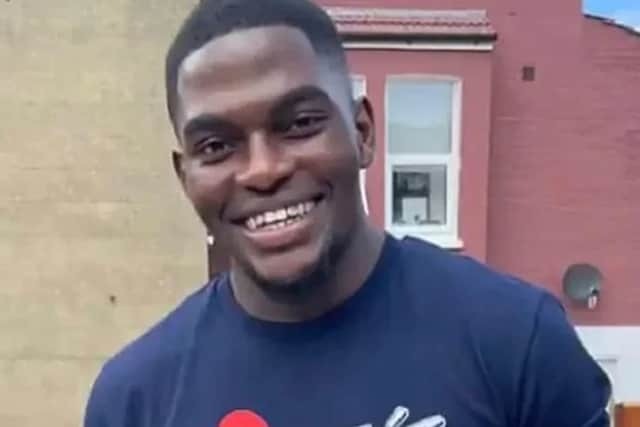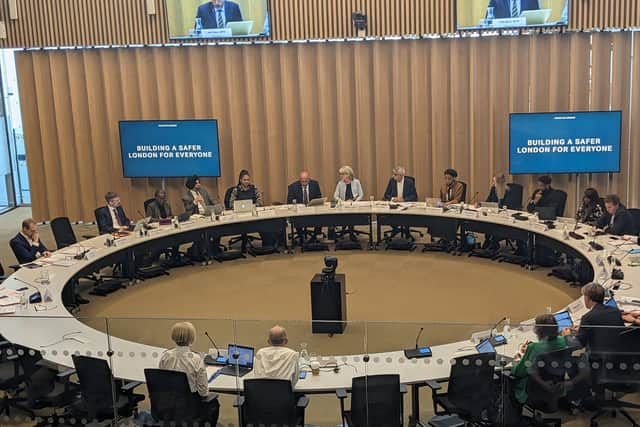Chris Kaba: Baroness Casey tells London Policing Board discourse about case is ‘incredibly unhelpful’
and live on Freeview channel 276
Baroness Louise Casey, author of a daming report into the Met Police’s culture and standards, has said the public discourse around the charging of an officer with the murder of Chris Kaba has been “incredibly unhelpful”.
Mr Kaba, a 24-year-old father-to-be, was shot through the windscreen of a car in Streatham Hill, south London, on September 5 2022. A Met Police firearms officer has been charged with his murder.
Advertisement
Hide AdAdvertisement
Hide AdA number of officers took a step back from their armed duties following concerns over the impact on their jobs of the Crown Prosecution Service’s decision to charge officer NX121 with murder. Over the weekend, officers from other forces were drafted in to help, and the Army has been put on standby to offer support, but the Met said on Monday that enough officers had returned to duty. A limited number of armed officers from other UK police forces continue to support non-counterterrorism armed policing.
Following the charge, home secretary announced a review of armed policing. Prime minister Rishi Sunak welcomed the announcement, while Met commissioner Mark Rowley called for changes to the rules.


Speaking at the first London Policing Board meeting at City Hall on Tuesday (September 26),
Baroness Casey said: “I want to start with recognising the last 48 hours and the media. I want to acknowledge there is an ongoing case, an officer has been charged with murder and a family is bereaved beyond recognition.
Advertisement
Hide AdAdvertisement
Hide Ad“I have found the public discourse on this incredibly unhelpful. What I would like to remind people is that there is a big reform issue and it is that we should be concerning ourselves with rather than anything, despite what the government is responding to.
“I think it would be better if we addressed the issues with a calm head in a slower time as we are dealing with something as serious as the armed end of our policing force.”
Mr Rowley said senior officers are having "ongoing discussions" to support staff to fully understand their concerns.
"Many are worried about how the decision impacts on them, on their colleagues and on their families,” he said.
Advertisement
Hide AdAdvertisement
Hide AdThe London Policing Board was created following a recommendation from Baroness Casey’s review of culture and standards in the Met.
The board members represent a range of expertise and backgrounds and will advise the mayor of London on changes needed at the Met Police.
The Casey Report, commissioned following the murder of Sarah Everard, was published earlier this year.
The review found institutional racism, homophobia and misogyny within the Met Police.


Advertisement
Hide AdAdvertisement
Hide AdBaroness Casey told the board she is “relieved” about how serious her report has been taken and praised the “calibre, quality and class” of its members, saying it gives her “hope”.
The board members include Stuart Lawrence, the brother of Stephen Lawrence, who was murdered in a racially motivated attack in southeast London in 1993.
The 12 board members’ backgrounds include community work, academia and policing. They are as follows.
Sir John Aston - Harding professor of statistics in public life at the University of Cambridge and former chief scientific adviser to the Home Office
Advertisement
Hide AdAdvertisement
Hide AdNeil Basu – Retired Metropolitan Police officer, formerly assistant commissioner specialist operations (ACSO) and national lead for counter terrorism policing
Tijs Broeke – Communications advisor, member of the City of London Police Authority Board and chair of London Metropolitan University
Nick Campsie – Economist, investor, charity founder and non-executive chair of the Legal Aid Agency Board
Carolyn Downs – Former chief executive of the London Borough of Brent with more than 40 years’ experience in local and central government
Advertisement
Hide AdAdvertisement
Hide AdSayce Holmes-Lewis - Founder & CEO of Mentivity, an award-winning mentoring organisation and provider of solution-led training with the Met, dedicated to cultural competency, racial equity and social justice.
Stuart Lawrence – Educator, author, and activist who promotes equality, diversity, justice and inclusion in education and society.
Susan Lea – Former vice chancellor of the University of Hull, psychologist, leadership coach and organisational change expert
Paula McDonald – Former senior civil servant and chair of youth charity Redthread
Advertisement
Hide AdAdvertisement
Hide AdNicola Rollock - Professor of social policy and race at King’s College London and specialist adviser to the Home Affairs’ Select Committee’s The Macpherson Report: 22 Years On inquiry
Andrea Simon – Director, End Violence Against Women (EVAW) Coalition and co-chair of the London VAWG Board
Leslie Thomas KC – Professor of law, barrister, author, human rights and civil liberties advocate
Members of the board will provide specialist advice to assist the mayor in holding the Met to account in delivering reforms.
Advertisement
Hide AdAdvertisement
Hide AdIn line with Baroness Casey’s recommendation, the new board will meet four times a year, modelled on the approach to accountability used by Transport for London.
Baroness Casey said: “Londoners, particularly those who have been let down the most, have had enough reports and reviews. They want change.
“So, the board’s role in helping drive the changes needed will be pivotal to delivering a police service that Londoners and officers who put themselves at risk in order to protect the rest of us can be proud of.”
